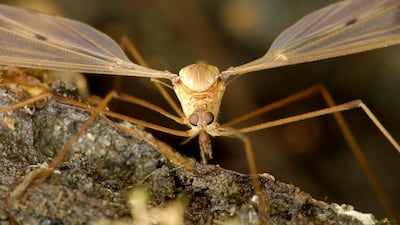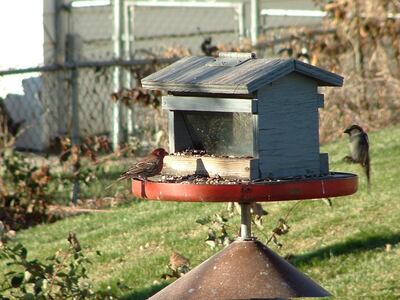Mum groups on social media are full of comments lamenting the apparent increase in bugs in the UAE (despite the rapidly warming weather), posted alongside images of their little ones covered in angry red welts.
While most bites are more annoying than harmful and will get better within a few hours or overnight, there are cases when these become swollen or infected, or lead to a severe allergic reaction, especially among children. Itching the bitten spot often draws blood, which can cause contamination.
Here are some ways for you and your children to remain bite-free.
Keep your space clean
Mosquitoes can breed anywhere, but they are most drawn to logged water and exposed food. “Cleaning your space is the most important step in preventing a mosquito infestation,” says Dr Deepti Chaturvedi, paediatrics specialist at Burjeel Hospital. “This includes everything from dirty containers and dishes with uncovered food or water, to bird feeders and the floor mats of your car.”
“Mosquitoes use pools of standing water to breed, so empty, scrub and throw out items that are holding water like buckets, planters, toys or trash containers. Even a pet’s water [and food] should preferably not be left out overnight,” says Dr Osman Labban, head of family medicine at Al Zahra Hospital Dubai.
Wear repellent and use netting
Gardens and parks, and even potted plants on your balcony are some of the worst offenders. “Flower beds are a hothouse for logged water, and mosquitoes are also attracted to dense shrubbery and damp grass. Teach your children to avoid these areas, whether in your apartment or villa, or in the park,” advises Chaturvedi.
“Mosquitoes become most active around dusk and dawn. So use insect repellent on exposed skin if you or your children need to be outside then,” says general physician Dr Aakriti Malla. “Also, ensure your kids are not playing around plants, rubbish, compost or stagnant water, especially at these times. Always wear shoes when outdoors, and even long sleeves and trousers if possible.
“Finally, keep doors and windows closed, or put up a screen or thin netting to prevent insects from getting inside the house.”
Car care is also important
Dr Vishal Rajmal Mehta, senior specialist and head of paediatrics at RAK Hospital, says: “Keep the area where you park your car clean and well lit. By doing so, you reduce the chances of mosquitoes migrating into your car's cabin.
“Keeping things clean also applies to the vehicle's exterior and interior. Mosquitoes are drawn to certain odours, primarily from us and our personal items, as the chemicals and scents we produce are transferred to our clothing, shoes and other belongings. Anything that gets in contact with our stuff then becomes a potential marker for mosquitoes to home in on. This includes our vehicle carpets and floor mats, where we leave spare footwear.
“Synthetic-leather seat cover doesn't breathe and makes you sweat more, thus, attracting mosquitoes inside your car. A fabric seat cover is an alternative or, better still, don't use any seat covers at all.”
Home remedies to try
Labban shares some natural remedies to keep mosquitoes away. “Burning coffee grounds is one of the simplest home remedies to get rid of bugs. They are repelled by the odour created by burning coffee grounds. Mosquitoes also cannot stand the smell of the lavender oil, so try spraying it in a room.”
Family medicine specialist Dr Ayesha Khalid says: “If you are using mosquito repellent sprays, remember that mosquitoes rest in dark, humid places like under the sink, in closets, under furniture or in the laundry room. Make sure you get to those areas,” she says.
Travel safe
“If you are travelling it’s advisable to learn about destination-specific health risks and recommendations,” says Malla. “Avoidance of mosquito bites should always be considered as the first line of defence against mosquito-borne infections such as malaria, dengue fever, chikungunya, Zika and yellow fever. Consult your doctor well before your trip if you are travelling to mosquito-borne disease endemic areas.”
What to do if you get bitten
In case of a bite, wash the affected area with soap and water and apply a cold compress or an ice pack to the swelling for 10 minutes, says Malla. “Avoid scratching the area, and only consider an anti-itch cream or antihistamine if the bite becomes very itchy.”
For children, who have more delicate skin, Chaturvedi recommends applying soothing calamine lotion. If you feel that an anti-allergic medicine or cream is required — in case of multiple bites or unnatural redness or bumps that won't subside — visit a paediatrician for the right prescription.
“The insect repellents sold for adults may be too concentrated for kids and cause unwanted side effects,” she says. “30 per cent Deet is the maximum concentration you should consider for children. Also, avoid spraying or applying these on their hands and faces, as they may lick their hands or put them near the eye area.”
For children, who may be exposed to vegetation, stagnant water and bugs even on school or sports trips, Dr Chaturvedi suggests Permethrin, an insect repellent that’s meant to be sprayed on clothing gear and tents (never on skin). “The spray lasts several washes, so your child will be safe even if he or she is not around you, and will be protected without the need for strong topical creams or sprays.”
Labban says that an over-the-counter hydrocortisone cream can also work. “If there is a localised redness that is spreading, any pus, pain or fever, then it’s time to consult a doctor,” he adds.



